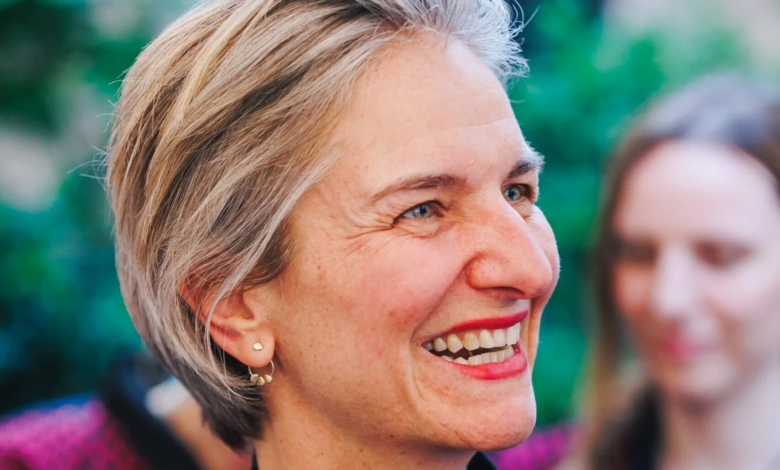Isadora Bigourdan : “accelerating adaptation: Providing African entrepreneurs with opportunities to innovate and address global challenges”
Africa should not be seen simply as a continent catching up but as a pioneer of tomorrow's world. By supporting its youth, celebrating its innovations, and massively financing its sustainable solutions, the world can find answers to its own challenges.

By Isadora Bigourdan*
Africa, often considered a developing continent, is actually a living laboratory of the future. Its dynamic youth, bold technological innovations, and ability to overcome unique challenges make Africa an inspiration for imagining and deploying frugal solutions to the challenges the world faces. Certainly, the continent faces major issues, such as connectivity and access to essential services. Yet, the entrepreneurial spirit is omnipresent, and everywhere, creativity seems to transform challenges into opportunities to invent, create value, and develop new solutions for communities.
In 2050, one in four inhabitants of the planet will live on the African continent
With a median age of 19, far from the 44 years in Europe, Africa is the youngest continent in the world. And this youth is a driver of change. By 2050, one in four inhabitants of the planet will live on the continent. Added to this are the 170 million people living outside the continent, constituting its diaspora. These allies contributed $100 billion to the continent’s wealth in 2024, making them the primary financiers, far ahead of international donors. The influence of the continent and its talents on the world’s evolution is real, and the New York Times article of October 28, 2023, announcing « how Africa’s population boom will change the world, » concludes that improving talent training and their accessibility in employment is everyone’s business.
The digital economy represents a significant pool of opportunities
The digital economy represents a significant pool of opportunities. By 2030, more than 230 million jobs in Africa will require digital skills, essential for driving employment and, more broadly, contributing to improving business productivity. And the continent’s talents have understood this well. Just look at the proportion of talents from the continent taking courses on platforms like Coursera or Open Classroom to understand that African youth are self-training and fully intend to contribute to transforming the world. Similarly, the African Leadership University, from Dakar to Mauritius, via Kigali, trains the leaders of tomorrow from the continent, anchored in their histories, cultures, and trained in new technologies. To illustrate the central role that Africa and its entrepreneurs play in deploying solutions to our VUCA world (volatile, uncertain, complex, and ambiguous), let’s take a few examples of solutions from Africa that are deployed or should be much more massively worldwide.
Water stress is a reality. Access to drinking water must evolve. No problem, Kumulus, an innovative Tunisian startup, is dedicated to facilitating access to drinking water using revolutionary technology. Founded in 2021 by Iheb Triki and Bilel Sahnoun, Kumulus develops devices capable of producing drinking water by extracting humidity from the ambient air. Noting that humidity was present in the desert, they had the idea of combining technological innovation and ease of use to allow small communities easy access to drinking water. Kumulus’s technology is based on a condensation process, similar to that used in air conditioners, but optimized to produce drinking water. Kumulus devices can generate up to 30 liters of drinking water per day, depending on atmospheric conditions. This water is then filtered and mineralized to ensure its purity and safety for human consumption. Kumulus operates today between Tunisia and France and is experiencing growing success in Southern Europe.
85 million jobs will be unfilled by 2030 worldwide… Another market opportunity for African edtech
In another field, the demand for digital professions is increasing. According to WEF estimates, 85 million jobs will be unfilled by 2030 worldwide. Another market opportunity for African edtech. For example, Sayna is a Malagasy edtech startup founded in 2018 by Matina Razafimahefa. It specializes in training digital skills and providing solutions that allow young Africans to enter the digital job market. Sayna offers technical courses in web development, programming, and other essential digital skills. Students work on concrete projects, thus gaining valuable practical experience. In addition to training, Sayna connects trained youth to online work opportunities, allowing them to perform micro-tasks for local and international companies. Since its creation, Sayna has experienced rapid growth. To date, more than 2,000 people have been trained through the platform, with an employment rate of about 90% for graduates. The startup plans to train 12,000 learners by 2024 and create a network of more than 3,000 active « microtaskers, » including in France.
Pioneering globally, Fintech is flourishing abundantly on the continent
Pioneering globally, Fintech is flourishing abundantly on the continent. Obviously, M-Pesa, a mobile money transfer platform that revolutionized financial services as early as 2007 and inspired similar initiatives worldwide, is emblematic of the pioneering nature of the continent’s startups. In 2024, M-Pesa continues to demonstrate its massive impact with over 51 million active monthly users in Africa. Another example is the acquisition of the Nigerian startup Paystack by Stripe for $200 million. Stripe announced that this acquisition allowed it to strengthen its presence in Africa, leverage Paystack’s infrastructure and relationships, and advance its goal of global growth in the digital payments sector. Beyond geographical expansion, the technological innovation deployed from Nigeria was at the heart of this rapprochement.
In terms of adaptation to constrained ecosystems, Africa is massively innovating in the agricultural sector. Again, the examples abound. Take WeFly Agri, founded in 2017 in Côte d’Ivoire, which revolutionizes agriculture with its cutting-edge technological solutions. By using drones to monitor fields, collect precise data, and optimize resource use, WeFly Agri allows farmers to improve their yields while reducing environmental impact. Thanks to these innovations, agricultural practices become more sustainable, saving water and minimizing excessive fertilizer use. The acquisition of WeFly Agri by JooL International in 2021 is a recognition of its transformative potential. By integrating WeFly Agri, JooL International strengthens its commitment to precision agriculture and digital transformation, aiming to offer even more advanced and sustainable solutions to farmers worldwide.
The list of disruptions from the continent is too long to be exhaustive. One last lesser-known example could be the impact of a Tunisian startup on resolving the Covid-19 pandemic. InstaDeep, founded in 2014 by Karim Beguir and Zohra Slim in Tunisia, is a pioneering company in the field of artificial intelligence (AI). Born from the shared vision of its founders to make AI accessible and useful, InstaDeep set out to transform the way companies and industries approach their most pressing problems. The idea is to democratize access to cutting-edge AI technologies, focusing on real and tangible impact. During the COVID-19 pandemic, InstaDeep played a crucial role by collaborating with BioNTech, famous for its development of mRNA vaccines. Using sophisticated AI algorithms, InstaDeep helped analyze genomic data of the SARS-CoV-2 virus, quickly identifying mutations and assessing their impact on vaccine efficacy. This analysis enabled a rapid and effective response, contributing to adapting vaccines to new variants of the virus. InstaDeep also revolutionized the logistics sector by using AI to optimize supply chains. Their machine learning algorithms improved process efficiency, reducing delays and costs, and ensuring faster product distribution. This clearly demonstrates the power of AI for the common good. InstaDeep was acquired by BioNTech in 2023, for a transaction valued at $680 million, the largest recorded on the continent. The acquisition of InstaDeep by BioNTech is an important step in using AI to accelerate innovation in biotechnology. It also marks significant recognition of the potential of African tech startups on the global stage, highlighting the importance of technological innovation in solving global public health challenges.
Certainly, Africa continues to attract investors’ attention but remains too much a niche market compared to the global giants of startup financing
For anyone lucky enough to be part of this African digital ecosystem, the sources of excitement are numerous. The level of astonishment at the lack of funding dedicated to supporting this living laboratory is equally high. In 2023, African startups raised a total of $3.2 billion. In comparison, global startup financing reached $285 billion that same year. This means that investments in Africa represent about 1.12% of total global venture capital investments. In 2024, African startups raised about $466 million in the first quarter, marking a 27% decrease compared to the previous quarter. This decline is part of a global trend of slowing venture capital financing, particularly affecting advanced funding stages. Meanwhile, opportunities are very unevenly distributed among the 54 countries on the continent. The « Big Four » (Nigeria, Kenya, South Africa, and Egypt) continue to dominate the startup financing landscape in Africa, attracting 87% of investments. And about 6% of funds are invested in startups led by female teams. The inequalities are glaring, preventing energies from deploying as they want. Certainly, Africa continues to attract investors’ attention but remains too much a niche market compared to the global giants of startup financing. And this is while the continent is full of creativity and talent that exploit challenges to transform them into frugal solutions in all sectors of activity.
Certainly, the venture capital sector is structuring on the continent, and very active funds like Seeds Star or Launch Africa are deploying. Thus, the recent announcement of a Partech Africa II fund in February 2024, with a final amount of €280 million (over $300 million), is good news. The arrival of new players like Ring or Breega is also a positive sign. Many funds are launching and often struggling to find institutional investors to follow them. Sovereign funds are structuring, like the Mohamed VI Fund, opening up to these activities. Funds of funds like Averroès, led by BPI, are accelerating. However, this remains too slow given the immense needs and challenges of enabling this creative youth to undertake quickly. Institutional investors from Africa and around the world must seize this opportunity to support the rapid and massive deployment of innovative solutions from the continent. Africa should not be seen simply as a continent catching up but as a pioneer of tomorrow’s world.
By supporting its youth, celebrating its innovations, and massively financing its sustainable solutions, the world can find answers to its own challenges. The future is being built today in Africa, and it is high time this is known.
*Lawyer and graduate of Sciences Po Paris in international affairs, I am a seasonded professional with 20 years of experience in structuring, financing and leading growing social innovation projects, mainly in Africa and Latin America. My career has led me to get involved in multi-stakeholder projects, with a partnership approach. To empower communities and their talent through changes, I use collective intelligence animation techniques on a daily basis, particularly through digital tools.
For ten years, I have focused my activities on financing and supporting start-ups deploying technological solutions serving the real economy and populations in Africa. In particular, I created and lead investment readiness and scale programs, such as SIBC, before leading the transformation of Digital Africa as COO then CEO.
I also train within Lab innovation and ventures studios as a mentor on investment readiness, strategy and governance. As a member of boards of directors and mission committees, I contribute to deploying new business models within companies combining financial profitability and social impact.






